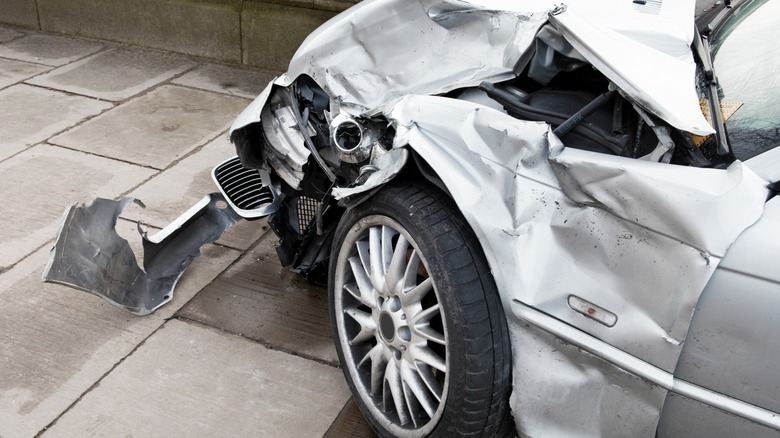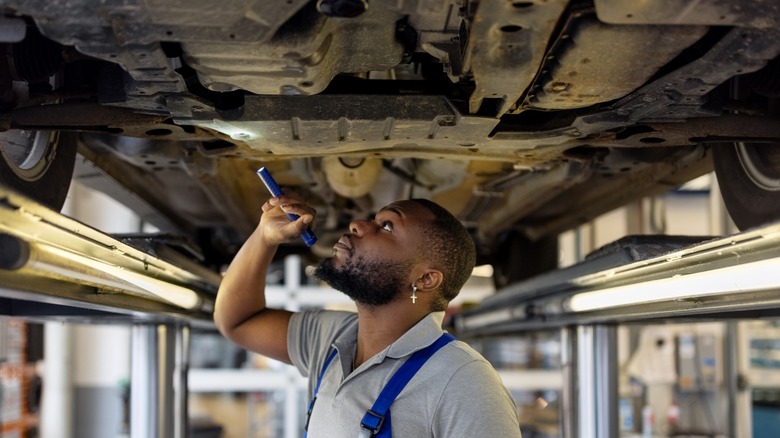8 Types Of Car Titles You Should Be Aware Of And What They Mean
A car title is an important part of car ownership. It's easy to overlook this detail when you're focused on finding the right car with the perfect price and mileage. But if you fail to inspect the car title, you could face some serious issues down the road.
That's mostly because the car title is a legal document that serves as proof of ownership and also contains essential information about the car's condition, its history, and any issues it might have had in the past. When it comes down to it, there are different types of titles, and each one has its own implications. When you understand what each title means, you will be in a position to make a more informed decision, avoid costly mistakes, negotiate better deals, and ensure you get the best value for your money.
There are probably more different types of titles than you may have realized. Here are the ones you should watch for, and what each one of them means.
Clean and clear titles
A clean title confirms that the car has no history of significant damage, and the previous owner has kept it in relatively good condition. For a prospective buyer, this has several important implications. First, a car with a clean title is relatively easy to insure. This is a big deal because, with other titles, coverage options are limited, and premiums can be much higher.
Additionally, when you buy a car with a clean title, you're most likely buying a safe and reliable car, and you can expect fewer surprises down the road. However, even with a clean title, you still need to perform due diligence before purchasing the car. Not all damage or issues will necessarily lead to a title change, so it's advisable to have a trusted mechanic inspect the car to catch any hidden problems.
Although people often use "clean title" and "clear title" interchangeably, each one has a specific meaning. A clean title means the car is free from significant damage, while a clear title also confirms that the car is free from any liens and legal claims. In essence, a clear title indicates there's no discrepancy about who owns the car and no outstanding debts attached. So, when you buy a car with a clear title, you can rest assured that you're not buying any debts or legal drama with it.
Salvage and junk titles
When it comes to car titles, a salvage title is a big red flag. It basically suggests the car in question has suffered severe damage, so much so that an insurance company declared it a total loss. This means the cost of repairing the car is higher than its market value, and fixing it isn't really economical.
However, this doesn't mean you can't repair the car. It just means that restoring it to a safe, roadworthy condition will require substantial work. Because cars with a salvage title sell for a fraction of their original market value, they can be a tempting bargain for people who enjoy flipping cars.
Buying a car with a salvage title comes with its fair share of risks. You cannot register or drive this car until you fix it. Even if you can repair the car, there's no guarantee it will meet the required safety and roadworthiness standards.
Now, here's where it's important to understand the difference between a salvage title and a junk title. Some states classify them as one and the same, but in other jurisdictions, there's a slight difference. With a junk title, the owner has no intention of ever driving the car again, whereas with a salvage title, the owner may consider fixing the car and returning it to the road.
Rebuilt or reconstructed title
You might be wondering what happens when the owner of a car with a salvage title decides to repair it. Well, if you're able to complete the repairs successfully, the vehicle has to pass through a rigorous inspection process to make sure it meets safety and quality standards. If it does, the state issues a rebuilt title, confirming that it's now fit for the road again. In some states, this title is known as a reconstructed title.
Compared to a car with a clean title, you might purchase a rebuilt title car at a lower price. So, if you're hoping to buy a car soon and you're on a budget, this may look like a good deal. In fact, a car with a rebuilt title can be a good bargain if the rebuilders or mechanics have taken great care and used high-quality parts for the repair.
But the thing is, buying a car with a rebuilt title is very similar to gambling. There's a high chance you may end up with a reliable car at a great price. There's also a very big chance you end up with a car that causes you more problems than it's worth. So, if you're looking to buy a car with a rebuilt title, have a reliable mechanic help you inspect the car. They might be able to tell if the repairs are legit or point out potential problems.
Bonded title
We mentioned earlier that a car title serves as proof of ownership. Now, what happens if you don't have a car title document showing you own the car or where you've purchased it from? In such a unique situation, getting a bonded title could be a temporary means of proving ownership.
To get a bonded title, the person claiming to be the owner has to purchase a surety bond, which is where the name comes from. This bond is usually set at nearly two times the car's market value. So, if someone challenges their claim to the car, the bond ensures there's money available to settle any disputes.
When you're looking to buy a car with a bonded title, you need to understand the precise reason the bond was necessary. Is it a case of an older car whose owner has simply misplaced the original title documents? Or are there deeper issues involved, like a dispute over ownership?
This context can help you gauge the risk involved. You should also know that bonded titles are usually valid for a specific period, typically three to five years. It is also very state-specific. Some states don't recognize a bonded title and won't issue one. It's important to be familiar with the rules and regulations surrounding them in your state.
Lemon law title
Let's say you've bought a car, and due to no fault of yours, the car keeps having issues. This is where the lemon law comes in. It's a state-specific statute designed to protect consumers from being stuck with defective vehicles.
While the exact provisions vary from state to state, they generally impose an obligation on the manufacturer or dealer to buy the car back if it has serious defects that cannot be repaired after a reasonable number of attempts. Once the manufacturer or dealer buys the car back, they often try to repair it again. If they succeed, they put it back up for sale, this time with a lemon law title.
Because of its history of damage and repair, the car sells for less than its original market value. Even though the manufacturer uses original parts and follows strict repair guidelines, there's no absolute guarantee that the issues won't resurface. On the plus side, you'll be getting the car at a discounted rate. This may seem like a great deal, especially if the manufacturer has fully repaired the defects.
Export title
If you have a classic car in the US and someone abroad is willing to buy it from you, you'll need an export title for the car to pass through customs and legally leave the country. When you apply for an export title, the state deregisters the car, meaning you can no longer drive it on public roads within the country.
Now, on the flip side, if you're considering buying a car with an export title, there are some important variables to consider. On the one hand, it's an opportunity to buy a unique or rare model that is not available domestically, maybe at a cheaper price. However, you need to confirm that the car complies with the regulatory standards in your country. That's because cars designed for a foreign market have different specifications, and you need to make sure the car will pass your country's safety and emissions standards. Additionally, you'll want to consider the costs and paperwork involved in importing the car into your country.
Beware of Title Washing
While we've given you a breakdown of the basic car titles you should be aware of, there's something else you should know about. It's a fraudulent practice called title washing, where someone transfers a car through multiple states until a car with a bad title, say a salvage title, carries a clean title.
Each state has different regulations regarding car titles, and some states may not carry forward the titles from other states. Dishonest dealers can move a car between states to erase the negative title branding, misleading potential buyers about the car's true history.
As a result, you might pay double what the car is worth and end up with a vehicle that's unsafe and unreliable. To avoid this sticky situation, conduct due diligence before buying a used car. Have a trusted mechanic inspect the car, request a vehicle history report, and ask a lot of questions.
Nonetheless, remember that title washing is illegal and can be prosecuted as a federal crime. If you suspect you've fallen victim to this fraudulent activity, report it to your local police station, the Department of Consumer Affairs, or your state's attorney general. They can assist you by starting an investigation, and if your suspicions are correct, you might be able to get compensation for your loss.







